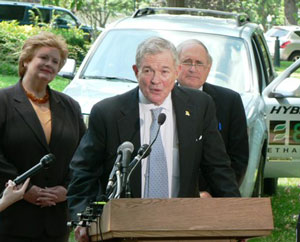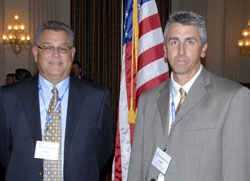While garbage trucks clean up our trash, too many times the trucks themselves have been polluting the environment through their emissions.
According to this Reuters story, a growing number of cities, including New York and San Francisco, are switching their garbage trucks to the greener fuel fleets to cut soot and greenhouse gases… without any extra costs:
“The greening of the waste management is here, but it’s not going to happen overnight,” said Bruce Parker, director of the National Solid Wastes Management Association.
New York, the largest city in the country, is the latest to pump biofuels into garbage trucks.
Starting July 1, the city will fuel its fleet of 4,500 garbage trucks with a blend of 5 percent biodiesel and 95 percent regular diesel known as “B5,” according to Rocco DiRico, assistant commissioner for support operations in New York City’s Department of Sanitation.
Officials estimate New York’s garbage trucks will emit 3 percent less particulate pollution. San Francisco, which switched 335 garbage trucks to B20 biodiesel, cut its emissions by about 21%.
These big cities might be considered somewhat as latecomers to the biodiesel game as several other cities such as Seattle, Washington; Portland, Oregon; Berkeley, California; and Grand Rapids, Michigan, have been using B20 for several years.


 Cellulosic ethanol maker SunOpta has received a $30 million investment from international financing firm BlackRock. More details of the plan issuing non-dividend bearing, convertible preferred shares was announced in
Cellulosic ethanol maker SunOpta has received a $30 million investment from international financing firm BlackRock. More details of the plan issuing non-dividend bearing, convertible preferred shares was announced in 

 “This legislation would set a floor for biodiesel demand, which will help ensure that the promising biodiesel industry continues delivering benefits to America,” said Joe Jobe, NBB CEO. “In addition to economic growth and pollution reduction, biodiesel delivers fuel refining capacity, something this nation desperately needs. Having a demand floor in place will help provide needed stability and reduce our dependence on foreign oil, which benefits all Americans.”
“This legislation would set a floor for biodiesel demand, which will help ensure that the promising biodiesel industry continues delivering benefits to America,” said Joe Jobe, NBB CEO. “In addition to economic growth and pollution reduction, biodiesel delivers fuel refining capacity, something this nation desperately needs. Having a demand floor in place will help provide needed stability and reduce our dependence on foreign oil, which benefits all Americans.” This Friday, officials with US BioEnergy including CEO Gordon Ommen, along with Minnesota Governor Tim Pawlenty, Fagen, Inc. CEO Ron Fagen, Minnesota Corn Growers Association Vice President Roger Moore, and local officials will celebrate the groundbreaking of a 100-million-gallon-a-year ethanol plant at Janesville, Minnesota. The ceremony starts at 11:00 a.m.
This Friday, officials with US BioEnergy including CEO Gordon Ommen, along with Minnesota Governor Tim Pawlenty, Fagen, Inc. CEO Ron Fagen, Minnesota Corn Growers Association Vice President Roger Moore, and local officials will celebrate the groundbreaking of a 100-million-gallon-a-year ethanol plant at Janesville, Minnesota. The ceremony starts at 11:00 a.m.
 U.S. Senators
U.S. Senators  Here’s an interesting application for propane that targets the dairy industry from a company that’s known for making gas fired appliances.
Here’s an interesting application for propane that targets the dairy industry from a company that’s known for making gas fired appliances. We think of propane as a cooking or heating fuel but how about mowers?
We think of propane as a cooking or heating fuel but how about mowers?